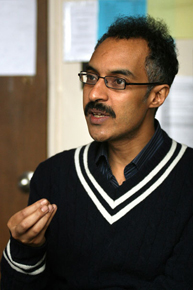Deconstructing hate: Scholar plumbs lure of Jihad
Deconstructing hate: Scholar plumbs lure of Jihad McGill University
User Tools (skip):
Deconstructing hate: Scholar plumbs lure of Jihad
In an impoverished country where economic hardship provides few options but to struggle for survival, the emergence of an underground economy should come as no surprise. But in late 1989, when Khalid Medani learned the Islamist government in his homeland of Sudan had executed a group of black markeeters — including someone he knew—surprise soon gave way to obsession.

Muslims want to understand what's happening to their religion, says Khalid Medani, McGill assistant professor of political science.
Owen Egan
"After that execution, I became obsessed with understanding the linkages between formal and informal institutions and the notion of identity in Islam," recalled Professor Medani, an assistant professor of political science and Islamic studies at McGill.
"Sudan was the first country where the fundamentalists completely took over power, and I wanted to know how and why they took power."
As it turned out, so did his fellow countrymen. "When fundamentalism came to Sudan, with prisons and tortures, my colleagues there said to me, 'Why don't you research and write about what's going on and tell the world?' Muslims are trying to understand what's happening to their religion and to their countries."
The sole Canada-based researcher among 21 recipients of the 2007 two-year Carnegie Scholarships, Professor Medani will return to Sudan, Somalia and Egypt in August to further his current research project, titled "Joining Jihad: A Comparative Political Economy of Islamist Militancy and Recruitment."
The $100,000 scholarship will pay his way.
The non-profit Carnegie Corporation of New York launched the Carnegie Scholars Program in 1999 to support innovative scholarship.
In recent years, the program has focused on Islamic issues.
"There's a real fear of Islam, and I think the media have unfortunately played into that," said Professor Medani, a Muslim from Sudan who has U.S. citizenship. He joined McGill in August 2006 from Stanford University, where he had been visiting professor of Islamic politics at the Center for International Security.
What leads young to radical Islam?
The focus of his research is to uncover what leads young people to join fundamentalist organizations.
He will do this through qualitative ethnography—studying and speaking with ordinary Muslims as well as local officials, setting up focus groups and, where feasible, conducting household surveys—and through historical and contemporary archival research.
His goal is to get a sense of the social and political situation, employment histories of the local population, levels of poverty and other issues that may facilitate recruitment by fundamentalist groups.
His research to date has taught him that the decision to join the fundamentalist movement is often the result of dire socio-economic circumstances rather than any particular ideology among African youth.
Like inner-city street gangs in North America, the fundamentalist movement gives young people a sense of belonging to something.
Even when the allure is more ideological, the motivations can be complex, he said, noting some youths join particular groups out of Islamic, ethnic or tribal loyalties.
By seeking to understand these motivations—and by writing about them—Professor Medani hopes to increase awareness among Muslims and non-Muslims alike.

